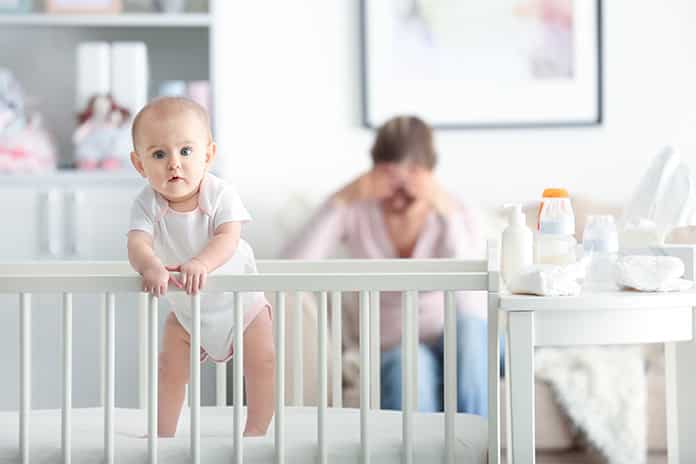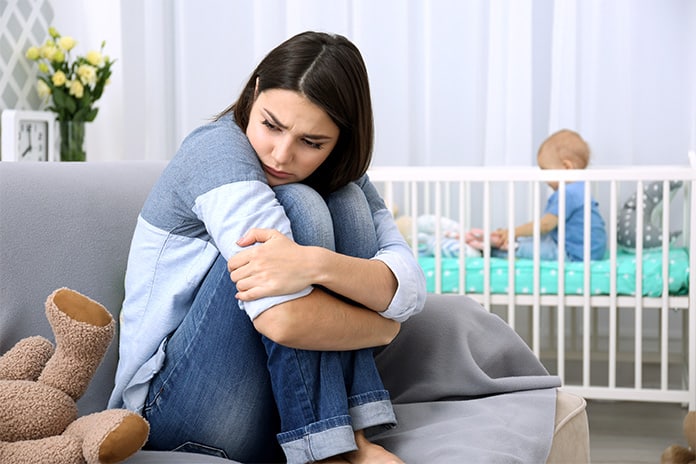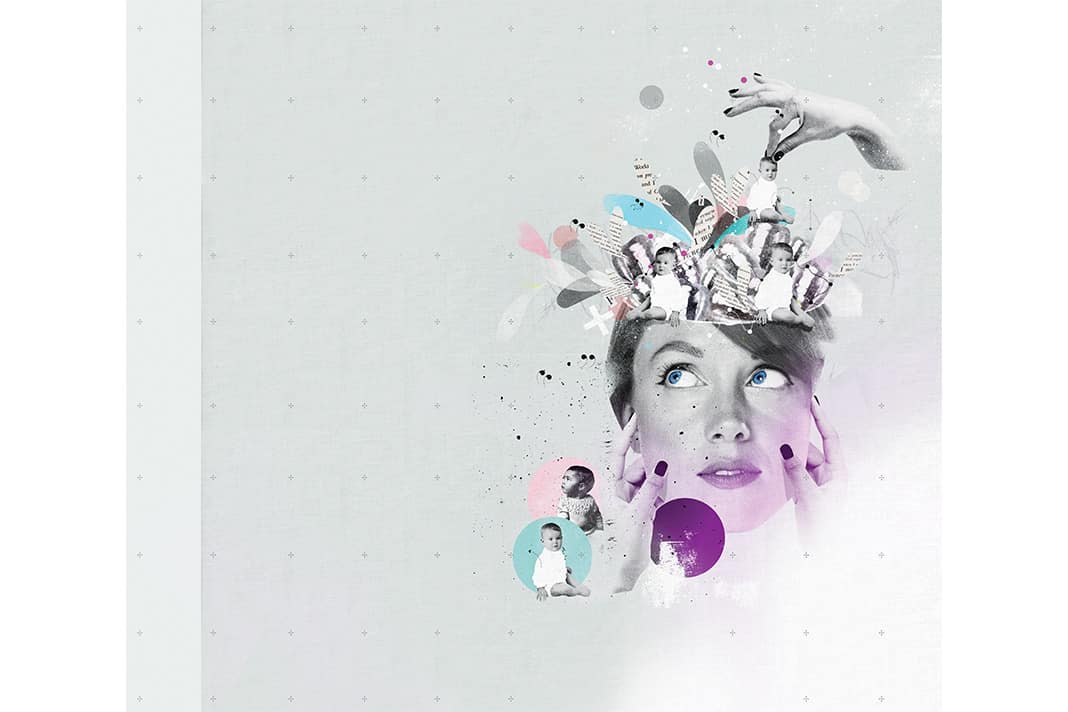Nearly half of mothers suffering from postnatal depression don’t get the proper care they need, and it seems to vary greatly depending on where you live. But is all that about to change?*
Sally was at a real low point when she decided to call her health visitor team in Lincolnshire. She had a five-month-old baby who just wouldn’t stop crying. She had started punching walls, even scratching her nails down her arms. She had nothing left to lose. “So I called the health visitors up,” she tells Absolutely Mama. “I remember struggling to hold back the tears. I left a voice message saying I think I have postnatal depression (PND) and that I really need to talk. I left my number but no one called me back… When you’re in that state, that’s not good at all.”
There are a few reasons why Sally had left it so long before going to a doctor. Firstly, it had never occurred to her that she had PND. She, like many other women, had thought it a condition that only appears soon after giving birth. It was also her second baby, and she’d not had a perinatal mental health issue the first time around. On top of that, Sally had thought PND was about “feeling sad, depressed and not bonding with the baby,” she explains. “Not for me. Anger, frustration, guilt; they were the sort of over-arching emotions. I didn’t associate them with PND.”
Eventually, Sally went to a GP who quickly diagnosed her with the condition. “He was very scientific about it. To have someone label it and give me a diagnosis was fantastic for me. That was a real turning point.”
While Sally decided to try both the therapy and medication her GP recommended, the diagnosis turned out to be enough to get her back on track (and the fact that her baby was sleeping again helped, too). In the end, she didn’t feel the need to take any of it, which was just as well, because she never got a call back about the counselling either.
Not the only one
Libby, who’s based in Yorkshire, has a similar story to Sally’s. “I struggled to cope from the day my little girl was born,” she recounts. “I was used to managing a team of people at work and always being ‘in control’, but nothing really prepares you for the total lack of control you have over a baby.”
Libby was very ill after the birth, so her husband had to do most of the childcare. She also had to start expressing despite the huge pressure she felt from society to continue breastfeeding. As the weeks continued, she began to feel more and more useless and a “burden” on her husband.
“I couldn’t understand why I was struggling so much as my little girl was a dream baby… I looked at other mums with their babies and thought I was the only one feeling this way.”
At her six-week check, the doctor didn’t give Libby much of a chance to discuss how she was feeling, instead focusing on the baby. Later, a health visitor read Libby’s responses to a postnatal depression survey and was shocked. She was told she’d get more regular visits and support from now on. “I didn’t see a health visitor again until my daughter’s one-year check. No one contacted me at all.”
More than two years on, and Libby has just finished a course of counselling (which she organised herself) and is finally feeling better. “It’s taken me all this time to share my experiences with my friends and I’ve been overwhelmed by their responses. Many of them said ‘I had no idea you suffered like this’. At first I couldn’t understand how they hadn’t seen what I’d been going through, but then I realised that I’d been putting on a brave face for others.
“It doesn’t matter what background you come from or how much money or help you have. It doesn’t even matter how ‘good’ your baby is perceived to be. Postnatal depression is indiscriminate and can affect anyone.”

A prevalent problem
More than one in every 10 women suffers from postnatal depression within a year of giving birth, according to statistics from the NHS. Yet NCT research shows around half of new mothers’ mental health problems don’t get picked up.
Michelle, the group email manager at PANDAS (Pre and Post Natal Depression Advice and Support) Foundation UK, has recently noticed an increase in complaints surrounding the support that GPs have given women and their families, especially when asking for advice on battling anxiety or when trying to conceive a second baby after suffering from PND the first time they gave birth. She says: “From my experience supporting women, it seems as though some GPs do not take them seriously. And at times, for these women, it feels like they are being brushed off.
“I believe that, in some cases, the reason so many women go without a follow-up check from their NHS/health visitor teams is that the NHS is overwhelmed with workload. The teams are often struggling with budget cuts, growing caseloads and extreme pressure. This, in turn, in some cases, may lead to many vulnerable people going without the support and care that they need and want.”
NCT’s Research and Evaluation Manager, Agnes Hann, has similar concerns. “We’ve heard positive and negative stories from women who live in different parts of the country,” she tells Absolutely Mama. “Some mothers have received incredible support from health professionals while others have not been supported nearly as well as they should have been.
“In terms of what support is available, GPs can provide information and advice to mothers themselves, refer them to psychological therapies or counselling services, or prescribe medication. Women in some parts of the country have access to specialist perinatal counselling services and Mother and Baby units; however, specialist community perinatal mental health provision is highly variable across the UK – some areas are much better than others.”
But is that all about to change?
The road ahead
This May, NHS England confirmed new and expectant mums will be able to access specialist perinatal mental health community services in every part of the country by April next year. It is now spending £23 million rolling out its second wave of community perinatal services to underserved parts of the
country, aiming to eventually have full geographical coverage.
Considering that in 2014 it was estimated that only 3% of the country had good access to perinatal mental health care, this is clearly a much-anticipated move. It’s also a move that forms part of a “package of measures”, worth a total of £365 million by 2021, to make sure at least 30,000 more women can access evidence-based treatment closer to home through these community services, as well as inpatient and baby units.
Dr Alain Gregoire, Chair of the Maternal Mental Health Alliance, said: “In over 30 years working for the NHS I have never seen any national programme produce such a rapid, effective and widespread transformation in services. These new, top-quality services have led directly to life-saving improvements in care for women and babies that will hugely reduce immediate and long-term suffering. The new developments announced… in England look set to eliminate a long-standing and serious postcode lottery, and will undoubtedly make England the world leader in mental health care for mothers and babies.”
Abigail Wood, Head of Campaigns at NCT, believes there’s more work to be done, however. “While it’s all well and good to improve specialist services, we need more focus on the recognition of mental health issues in the first place. More money going into early identification would mean fewer mothers suffering with mental health problems and needing specialist care further down the line.
“The charity’s #HiddenHalf campaign is calling for extra funding for the six-week postnatal check-up to reduce the number of new mums who don’t get diagnosed and treated properly.”

The other side
Of course, not every woman’s experience with postnatal depression has been as negative as Sally’s and Libby’s. For instance, Cumbria-based Justine, who was over 40 years old when she had her first daughter, only has praise for her health visitor team. “In fairness, I was classed as high risk throughout my pregnancy due to my age,” she tells us. “So my personal contact was high with the individuals.”
But this also meant that the risks of delivering at an older age, and the higher prevalence of sudden infant death syndrome, came up a lot. “When poor India came along I was so scared of losing her!”
When her daughter was rushed to the hospital at just three days old, things only got worse for Justine. “I think that’s when I began to think something was wrong and that I didn’t just have the baby blues. I was crying all the time. I couldn’t keep it together, I couldn’t hold conversations.” At this point, Justine’s health visitor team came to the rescue.
“Instead of going to a clinic, they would come and do a home visit to reduce my stress.” Treatment was swiftly discussed and Justine decided to take a low-dose medication and had monthly follow-up appointments to chat. This all led to her quick recovery.
Meanwhile, in Gloucestershire, Lindsay had a similarly positive experience, although her PND – like Sally’s – was delayed. “My problems started about four months in, so the regular health visitor visits had stopped at that time.” Lindsay was crying every day and felt truly exhausted, as her baby wasn’t sleeping. To top it off, she was struggling with breastfeeding. “It all just crept up on me,” she admits. So she quickly decided to call the health visitors.
“They had staffing changes and I didn’t have an assigned health visitor at the time, and the next team meeting wasn’t for a few days, but the kind lady who answered the phone could tell I was desperate and needed help so she came out to see me that day.
“She was great at listening and then telling me the options for support and working out a plan with me. She advised I see a doctor. My doctor was amazing.” Lindsay declined medication and decided to start expressing her milk and allowing someone else to feed, which helped. “My doctor phoned me once a week to check in on me until I decided I no longer needed that help. My health visitor visited me weekly and provided a listening service… Instead of counselling I’ve been referred to a service that offers cognitive behavioural therapy support over the phone, and I’m currently at the beginning of that.”
Smashing the stigma
Education and awareness is key to making sure new mothers – and indeed other family members – do not suffer unnecessarily. But we still have a way to go in that regard. “Unfortunately, there is still a lot of stigma and discrimination around mental health in general,” says NCT’s Agnes Hann. “Perinatal mental health problems, including postnatal depression, are no exception.
“As awareness of maternal mental health problems increases, stigma will hopefully reduce. That’s why it’s so important to talk about these issues, and normalise the range of experiences women may have during pregnancy and after having a baby.”
Sally agrees. In fact, following her personal experiences with PND, she went on to set up her own company, Mum’s Back (mumsback.com), which provides luxury hamper gifts for new mums. Through this, she also aims to raise as much awareness of perinatal mental health issues as possible, and £1 from every hamper sold goes to PANDAS Foundation UK.
“I just think it’s so common,” she says. “It’s all about breaking the stigma, encouraging people to have the confidence to talk about it, and to understand that this sort of rhetoric – it’s such a ‘magical time’ and to ‘cherish every moment’ – is being rammed down your throat so that when it doesn’t feel like that you feel guilty, you feel ashamed, you feel like you’re a crap mum, and you shouldn’t be made to feel like that.”
While the NHS is making a huge effort to combat such issues, it’s also up to us to do our part as well. We can do this by opening up about our personal experiences, by listening to our friends and family, and – most importantly – by not perpetuating a stigma that should not still exist in 2018.
If you or someone you know might be suffering from a perinatal mental health issue, please seek help from your GP immediately. For more information on postnatal depression, also visit NCT and Pandas
* Some names in this story have been changed to protect the privacy of participants.






COMMENTS ARE OFF THIS POST